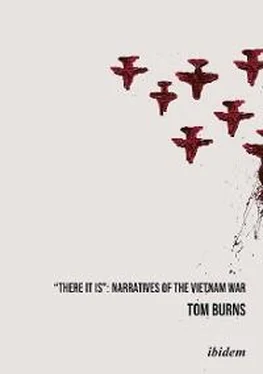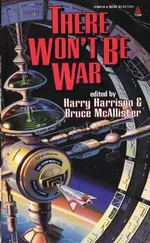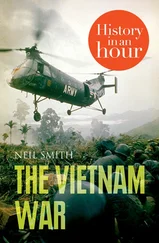Tom Burns - There It Is - Narratives of the Vietnam War
Здесь есть возможность читать онлайн «Tom Burns - There It Is - Narratives of the Vietnam War» — ознакомительный отрывок электронной книги совершенно бесплатно, а после прочтения отрывка купить полную версию. В некоторых случаях можно слушать аудио, скачать через торрент в формате fb2 и присутствует краткое содержание. Жанр: unrecognised, на английском языке. Описание произведения, (предисловие) а так же отзывы посетителей доступны на портале библиотеки ЛибКат.
- Название:There It Is: Narratives of the Vietnam War
- Автор:
- Жанр:
- Год:неизвестен
- ISBN:нет данных
- Рейтинг книги:5 / 5. Голосов: 1
-
Избранное:Добавить в избранное
- Отзывы:
-
Ваша оценка:
- 100
- 1
- 2
- 3
- 4
- 5
There It Is: Narratives of the Vietnam War: краткое содержание, описание и аннотация
Предлагаем к чтению аннотацию, описание, краткое содержание или предисловие (зависит от того, что написал сам автор книги «There It Is: Narratives of the Vietnam War»). Если вы не нашли необходимую информацию о книге — напишите в комментариях, мы постараемся отыскать её.
There It Is: Narratives of the Vietnam War — читать онлайн ознакомительный отрывок
Ниже представлен текст книги, разбитый по страницам. Система сохранения места последней прочитанной страницы, позволяет с удобством читать онлайн бесплатно книгу «There It Is: Narratives of the Vietnam War», без необходимости каждый раз заново искать на чём Вы остановились. Поставьте закладку, и сможете в любой момент перейти на страницу, на которой закончили чтение.
Интервал:
Закладка:
Barclay, who was appointed liaison officer between the Americans and the Vietnamese plotters, objects to the plot because he knows that Tran does not have the support of the other generals to bring off a successful coup, but MacKenzie takes Tran at his word and, dazzled by a beautiful prostitute, is also misled by Mouchette, who instructs him not to be receptive to other coup proposals, including the true one. Mouchette is anxious to stay on the good side of Tran and the present regime until circumstances dictate otherwise, when it becomes “time to shift his loyalties once again, so that he would land on his feet when the government toppled,” as he always manages to do (185).
With such inept Americans in the saddle, the phony coup does not come off because the junta led by “Big Linh” (i.e. the historical “Big Minh,” or Duong Van Minh) has been plotting the action that will in fact topple Diem. Barclay uncovers the phony plot through an old friend, Colonel Ling, who tells him that Tran must be bluffing since he has not actually recruited any army units. US intelligence, for its part, has learned of Diem’s attempt to propose a separate arrangement with the Communists, which in the novel is seen as his attempt to gain a cease-fire merely to deal with the plots against him. Barclay, frustrated in his attempts to inform MacKenzie about what is really going on, only succeeds in persuading Tran to postpone his phony coup in order to coincide with the real one.
The generals have to decide if they are to simply assassinate Nhu and thus make Diem more pliant (which might, however, have the opposite effect), to encircle Saigon and force a surrender, which would probably take too long, or to attack the forces loyal to Diem and risk provoking civil war, which they decide on as the swiftest and most decisive course of action. These are historically the three choices the plotting generals faced. 42To get the forces loyal to Diem out of the city, Colonel Linh asks Barclay to help by threatening to withhold US aid unless these forces are sent to the field, a power that Barclay, a lieutenant colonel, would be unlikely to have. Barclay learns, however, about an assassination list that has the names of both Doung and his wife Lé on it, and Duong tells Barclay at this point that he knows about his affair with his wife but has done nothing about it because he might need “insurance” against a coup. This restraint is plausible, but Duong’s death strikes a peculiarly false note, perhaps the weakest part of the novel. The reader is asked to believe that a scheming, sadistic murderer like Duong would seek his final peace in a Buddhist monastery, even being granted a glimpse of nirvana before he is gunned down.
The details of the last hours of Diem and Nhu conform to the historical record—Diem’s phone call to Lodge, their escape to a house in Cholon, their taking refuge in the church, and the assassination of both men in an armored personnel carrier (a fictional addition is the cruel officer who kills the Ngo brothers and is also the murderer of Lé in the end). Diem is given some dignity by quietly and courageously facing his death while Nhu constantly frets for his life, unwilling to face the inevitable. Barclay, who has already escaped an attempted assassination on the street by Tran’s men, is finally killed by his old friend Linh, with the lame explanation that Barclay’s name was the last on the list. The reader has to ask the obvious question: could not Linh, the new head of state, simply erase it?
Vaughn’s novel is a “thriller” that successfully mixes historical and fictional characters and events but leaves several questions related to the politics of the coup unanswered. Is Barclay’s assassination meant to show Linh’s ingratitude toward the man who once saved his life and therefore Linh’s unworthiness to lead the nation? General Minh, in fact, would last only three months in power, and was toppled by General Kanh in January 1964. Or is the reader meant to reflect on the fact that in violent reversals of the status quo the wrong people often get hurt? Or does the narrative simply need to avoid the reunion of the two adulterous lovers? Barclay’s death does not make sense in the terms established by the novel because he has been the only American to cooperate with the plotting generals, unless it is meant to be a critique of the American support of the coup. The only explicit indictment of that support is an observation by a French priest that “Diem was a symbol” of Vietnam’s independence, which the Americans will destroy by ousting him, but the novel is also critical of Diem’s regime as authoritarian and anti-democratic. The elections, for example, are shown to be rigged (“a burlesque,” as Barclay observes) with a numerical victory no one believed in but that MACV accepted “as evidence of the success of the democratic process” (176).
Finally, author Vaughn, a former US Army helicopter pilot in Vietnam, seems to believe that nobody in Vietnam would willingly be a Communist; those who have chosen that side must have done so for lack of a viable alternative. General Linh mentions a former comrade who is not a Communist but has managed to become the senior Vietcong commander in the Saigon area (an unlikely promotion). This worthy commander is ideologically opposed to the VC but does not go over to Diem’s army for fear that he will be simply interrogated and shot. “If we had a government that men like him could respect and trust, the VC problem would be solved” (145), Linh says, an admission that underlines the paranoia and lack of trust engendered by the South Vietnamese regime. The implication, which Linh does not seem to be aware of, is that the enemy does support and put trust in their leaders and this may be one reason why they will win.
iv. Morris West, The Ambassador (1965)
West’s novel concentrates on Diem’s persecution of the Buddhists, the conspiracy against him, and his eventual assassination, with the unwilling compliance of the American ambassador, “Maxwell Gordon Amberley,” based on Henry Cabot Lodge. 43Amberley is regarded as a shrewd professional, an ambassador for ten years but now somewhat at a loss after the death of his supportive wife. He is undertaking instruction from a Zen Buddhist master in Japan when he is called upon to deal with the current government crisis in Vietnam. An assistant explains (again, by the domino theory) that the US has become involved in the country because “we want to maintain a military foothold in Southeast Asia. If South Vietnam goes, Thailand is outflanked and Singapore is threatened,” and “we backed Phung Van Cung [Diem’s name in the novel] and his family because they were the best and strongest administrators available” but can no longer be controlled (9). Cung and his family are persecuting the Buddhist majority and will no longer listen to reason, i.e. do what the Americans tell him to do. It is essentially Amberley’s job to give him this message more firmly or help get rid of him.
The ambassador finds it exciting that the streets in Saigon are tense until he witnesses the suicide of a Buddhist monk. Because the suicide coincides with his arrival, he realizes he has been an “accomplice.” To put pressure on President Cung to cease the persecution of the Buddhists, Amberley announces the threat of US sanctions, including an immediate stop to funding and the gradual withdrawal of military personnel. His top military commander, General Tolliver, realizes that the war cannot be won as long as their allies are a liability owing to their political intrigues among the high command, demoralized troops, and rampant economic waste.
The embassy’s political advisor, Mel Adams, the voice of reason in the novel, argues that Cung’s administration is “a ramshackle dictatorship founded on mandarin ethics, warlord intrigues, the secret police and old-line Gallic Catholicism” (34). Cung has alienated the students, lost the allegiance of the rural people, and isolated himself by surrounding himself with sycophants—an accurate summary of some of Diem’s failings as president. When Amberley asks Adams what policy should be put forward in these circumstances, he advises pulling out and letting the country “determine its own future,” a policy that at the time of West’s novel seemed correct to very few Americans in high places. The ambassador, for example, objects that “Uncle Ho” would soon take over if that were the case. “He’s taking over now,” said Mel Adams flatly. “He’s taking over because the man who truly wants to rally the country lacks the talent to do it; because we are bankrupt of everything but arms, men and money” (62).
Читать дальшеИнтервал:
Закладка:
Похожие книги на «There It Is: Narratives of the Vietnam War»
Представляем Вашему вниманию похожие книги на «There It Is: Narratives of the Vietnam War» списком для выбора. Мы отобрали схожую по названию и смыслу литературу в надежде предоставить читателям больше вариантов отыскать новые, интересные, ещё непрочитанные произведения.
Обсуждение, отзывы о книге «There It Is: Narratives of the Vietnam War» и просто собственные мнения читателей. Оставьте ваши комментарии, напишите, что Вы думаете о произведении, его смысле или главных героях. Укажите что конкретно понравилось, а что нет, и почему Вы так считаете.












